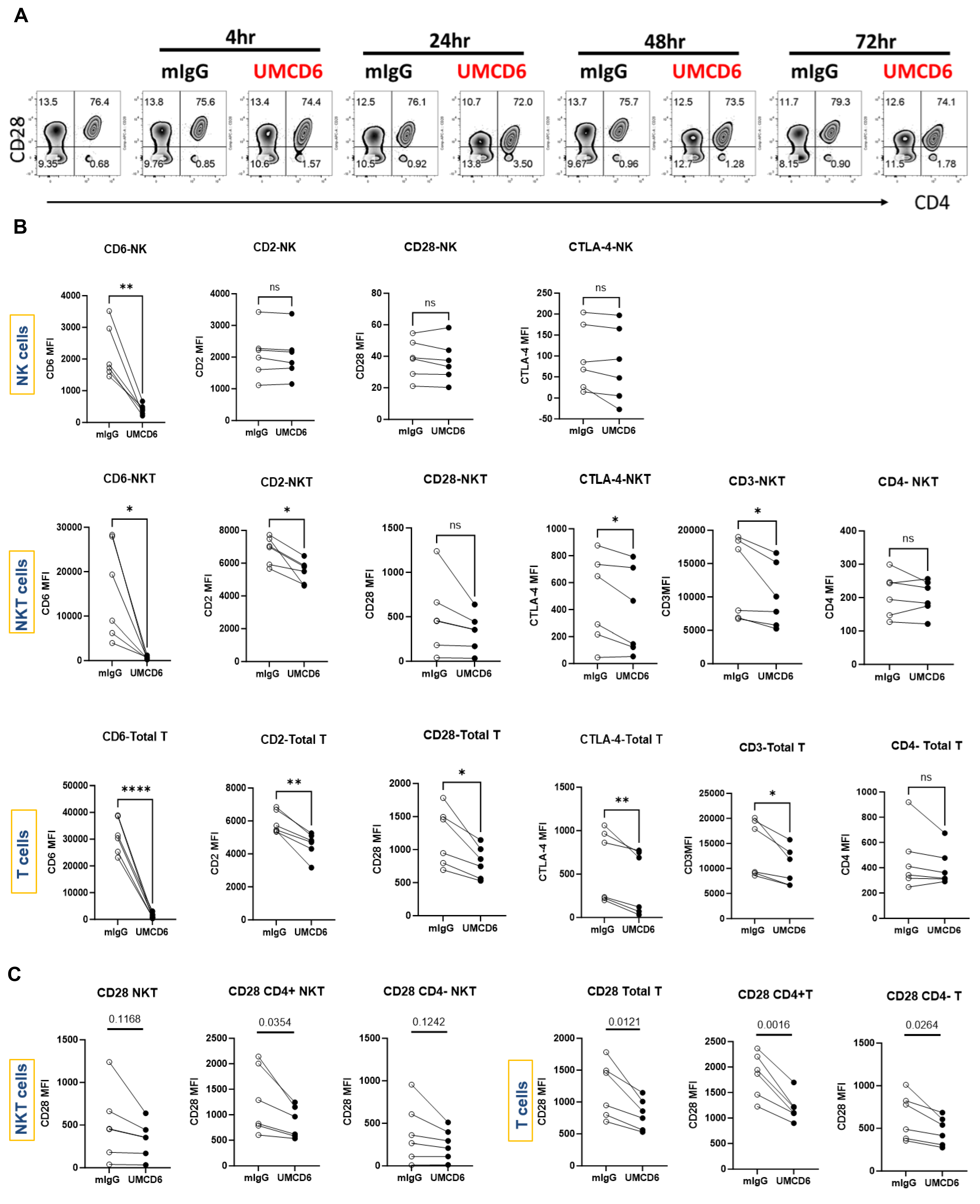Session Information
Date: Monday, November 18, 2024
Title: T Cell Biology & Targets in Autoimmune & Inflammatory Disease Poster
Session Type: Poster Session C
Session Time: 10:30AM-12:30PM
Background/Purpose: CD6, expressed on T cells and 50% of NK cells, is emerging as a novel treatment target for both cancer and autoimmune diseases. We first showed that CD6 deficiency leads to significantly attenuated disease severity in murine models of multiple sclerosis, uveitis, and rheumatoid arthritis, in all of which autoreactive CD4+T cells are the primary drivers of pathogenesis, suggesting CD6 on CD4+T cells as a potential therapeutic target for these autoimmune diseases. Indeed, in CD6-humanized mice treated with UMCD6, an anti-human CD6 monoclonal antibody, striking reductions in clinical signs of disease, pathogenic Th1/Th17 responses, and inflammatory cell infiltration into the target organs were observed. UMCD6 works in a different way as a cancer immunotherapy agent, altering the gene expression pattern of cytotoxic CD8+T and NK cells to augment their cytolytic capabilities. Importantly, UMCD6 does not deplete T-cells but instead, leads to the rapid internalization of CD6. In assessing whether other lymphocyte surface structures co-internalize with CD6, we recently found that CD28 expression on the cell surface is robustly reduced in a sustained manner, especially on CD4+T cells.
Methods: Human PBMCs were isolated from healthy volunteers and cultured in RPMI media + 10% FBS with or without UMCD6 (10µg/ml). CD2, CD3, CD4, CD6, CD28, CD40L, and CTLA-4 expression was measured by Flow Cytometry using antibodies from BioLegend: CD2 (TS1/8), CD3 (UCHT1), CD4 (OKT4), CD6 (BL-CD6), CD28 (CD28.2), CD40L (24-31), and CTLA-4 (BNI3).
Results: UMCD6 rapidly depleted CD6 from the cell surface of T cells and NK cells. Cell surface expression of CD28 and CD2 was concurrently reduced (Figure 1A, B, C). CTLA-4 and CD3, but not CD4 were also reduced (1B). These changes persisted for at least 72 hours. The decrements in the various structures were most striking on T cells, somewhat less on NK-T cells, and not seen with NK cells (other than >90% reduction in expression of CD6). At baseline, very few CD4+ cells are CD28-negative, but many of CD4-negative (mostly CD8+) cells are CD28-negative (42%). This proportion increases to 58% by 24 hours following exposure to UMCD6. The change in CD28 expression on CD4+ cells is best appreciated as a decline in mean fluorescence intensity in the UMCD6 group compared to the IgG control. The reduction in CD28 MFI was more significant among CD4+ cells compared to CD4-negative cells (1C).
Conclusion: Considering the function of CD28 as a receptor for the second signal that leads to activation of CD4+T cells, with CD2 as a potential alternate second signal, alteration of CD28 and CD2 expression by UMCD6 is an attractive explanation for the effect of UMCD6 on autoimmune diseases and is potentially a significant step towards immune tolerance. Since many cytotoxic CD8+T cells are CD28-negative at baseline, further loss of surface CD28 on the CD8+ subset caused by CD6 internalization is not expected to compromise function of these cells. These results provide an explanation for the ability of UMCD6 to selectively inhibit CD4 cell function while concurrently stimulating cytotoxic lymphocytes to kill cancer cells, thereby offering the prospect of a new cancer immunotherapy that suppresses rather than triggers autoimmunity.
other cell surface proteins.
A – PBMCs from healthy donors were cultured for the indicated time in RMPI supplemented with 10% FBS with either mouse IgG or UMCD6 10 micrograms/ml. CD3-gated cells were analyzed by flow cytometry for expression of CD4 and CD28. Results are shown on a log scale. By 4 hours, and persisting through 72 hours, CD28 expression is reduced by about 50% (MFI – mean fluorescence intensity) on CD4+CD3+ and CD4-CD3+ cells cultured with UMCD6 (anti-CD6 mAb) compared to baseline or control mouse IgG cultures.
B – Cells cultured as above for 72 hours were analyzed by flow cytometry for expression of various cell surface molecules. T cells were gated as CD3+CD56-, NK cells as CD3-CD56+, NK-T cells as CD3+CD56+. MFI of cultures with mouse IgG was not different from baseline. More complete internalization of CD6 was noted on T cells and NK-T cells cultured with UMCD6 compared to NK cells, although baseline CD6 expression was lowest on the NK cells. Significant reductions in surface expression of CD28, CD2, CD3 and CTLA-4 were noted on T cells but not NK cells (with intermediate effects on NK-T cells). The p values are *<0.05,**<0.01,***<0.001,****<0.0001, by paired t-test.
C – Cells cultured as above for 72 hours were analyzed by flow cytometry to compare the UMCD6-induced reduction of CD28 cell surface expression on CD4+ versus CD4- T cells and NK-T cells. CD4+ cells had higher baseline CD28 MFI and more substantial and significant reduction in CD28.
To cite this abstract in AMA style:
Gurrea-Rubio M, Wu Q, Amarista C, Tsou E, Campbell P, Ikari Y, Cooney L, Fox D. Reduction in CD4+T Cell Expression of CD28 and CD2 by Antibody-induced Internalization of CD6: A Potential Step Towards Immune Tolerance [abstract]. Arthritis Rheumatol. 2024; 76 (suppl 9). https://acrabstracts.org/abstract/reduction-in-cd4t-cell-expression-of-cd28-and-cd2-by-antibody-induced-internalization-of-cd6-a-potential-step-towards-immune-tolerance/. Accessed .« Back to ACR Convergence 2024
ACR Meeting Abstracts - https://acrabstracts.org/abstract/reduction-in-cd4t-cell-expression-of-cd28-and-cd2-by-antibody-induced-internalization-of-cd6-a-potential-step-towards-immune-tolerance/

